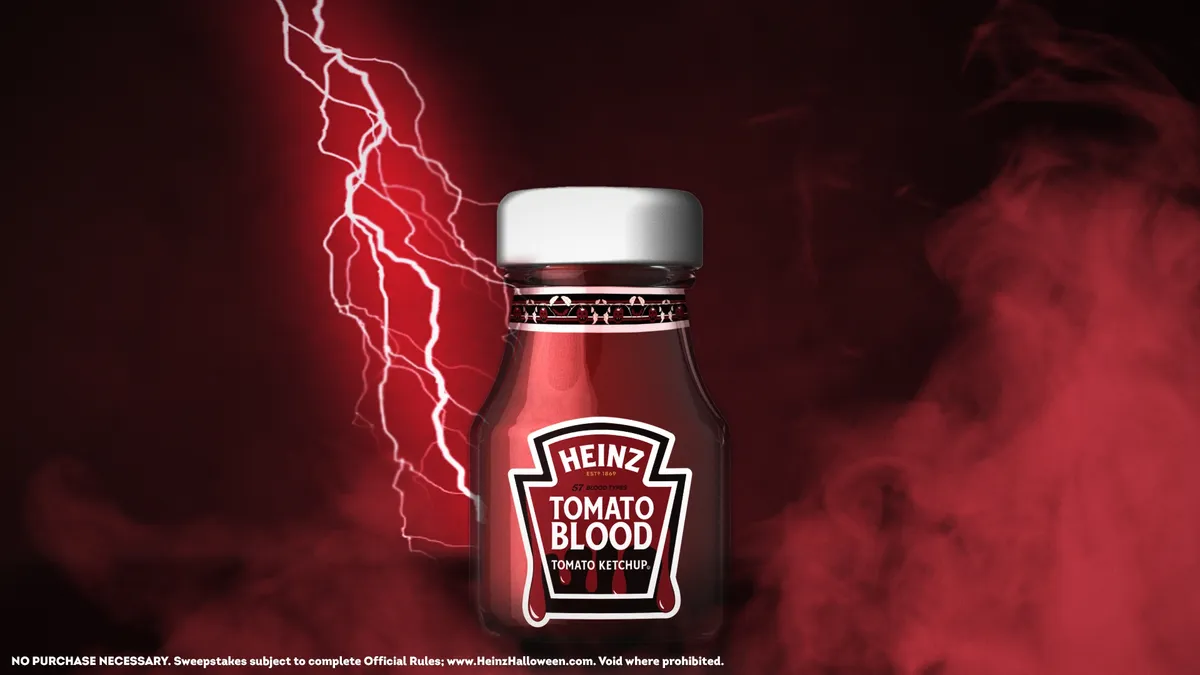Brief:
- Heinz is challenging TikTok users to share videos of their Halloween preparations for a chance to win a bottle of its limited-edition Heinz Tomato Blood Ketchup, per a press release. The Kraft Heinz-owned brand is giving away 570 bottles of the ketchup, whose Halloween-themed label glows in the dark.
- Heinz is asking TikTok users to create a video of their Halloween transformation with a bottle of Heinz Tomato Ketchup or a depiction of the brand, and post it to the social video app with the hashtags #HeinzHalloween and #sweepstakes in the caption by Oct. 31. Entrants also must fill out an online form with their TikTok handle and other information for a chance to win, per the contest rules.
- Even as TikTok's future in the U.S. is in doubt, major marketers continue to utilize the app with impressive results: since launching on Friday, the #HeinzHalloween hashtag has been viewed about 1.7 billion times, as of press time. Heinz developed the Halloween-themed campaign with agency Wieden+Kennedy NY.
Insight:
Heinz aims to engage younger consumers with its #HeinzHalloween sweepstakes on TikTok, the social video app that's popular with Generation Z. With 1.7 billion views in just a few days, it appears that the campaign is off to a strong start. As more people share videos of the challenge with their friends, families and followers, Heinz can extend the reach of the campaign among millions of TikTok users. Because the Heinz asks U.S. adults ages 18 or older to submit personal information in the entry form, the brand can collect valuable consumer data to help inform its future marketing efforts after the Halloween-themed campaign ends this week.
Heinz also enlisted family-oriented TikTok personalities including Jason Coffee, the Richards Family and the Chambers family, who collectively have tens of millions of followers, to create sponsored videos for the campaign, helping to ensure that more people view it. By collaborating with a diverse group of influencers, Heinz's campaign is more likely to reach a broader audience. Influencer marketing has become more integral to diversity and inclusion efforts by brands after last summer's global protests against racism and inequality. More than a third (36%) of consumers who follow online personalities said they had diversified their selection of influencers after the protests, according to a survey by coupon marketer Valassis.
Heinz's campaign comes as parent company Kraft Heinz ramps up its marketing spending in the second half of the year after suspending or delaying campaigns during the onset of the coronavirus pandemic in March. With more consumers cooking at home and seeking out familiar comfort-food brands, Kraft Heinz experienced a 7.4% gain in revenue to $6.65 billion in Q2 from a year earlier, per a quarterly report. The company will provide more insights about recent trends when it reports Q3 results on Oct. 29.
Heinz is the latest marketer to develop a branded hashtag challenge to engage younger consumers with their recent promotional efforts. Chipotle Mexican Grill, the quick service chain that was was an early adopter of TikTok, most recently ran a challenge that asked people to film themselves shooting a 53-foot basket for a chance to win food and tickets to an NBA game. Cinnamon Toast Crunch, the cereal marketed by General Mills, this month generated billions of views with a singing challenge on TikTok that featured musical artists Jason Derulo and Bebe Rexha. Before than, Danone's Oikos Triple Zero yogurt brand last month also saw billions of views for its challenge and influencer campaign aimed at football fans.
Heinz's Halloween-themed challenge is a sign that brands are still developing campaigns for TikTok, which faces the possibility of being banned in the U.S. because of national security concerns. TikTok's parent company ByteDance is seeking a deal to avoid a ban, though the result of those talks remains uncertain. The Trump administration last week defended its attempt to ban TikTok, alleging in a court filing that the app makes U.S. user data susceptible to influence by Chinese leaders, The Wall Street Journal reported. The administration seeks to move forward with restrictions to make TikTok unusable in the U.S. on Nov. 12.














